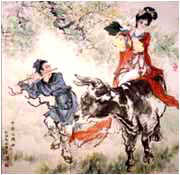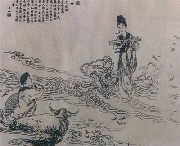 On the evening of the seventh day of the seventh month on the Chinese lunar calendar, don't forget to look carefully at the summer sky. You'll find the Cowherd (a bright star in the constellation Aquila, west of the Milky Way) and the Weaving Maid (the star Vega, east of the Milky Way) appear closer together than at any other time of the year. Chinese believe the stars are lovers who are permitted to meet by the queen of Heaven once a year. That day falls on the double seventh (Qixi in Chinese), which is China's own Valentine's Day.
On the evening of the seventh day of the seventh month on the Chinese lunar calendar, don't forget to look carefully at the summer sky. You'll find the Cowherd (a bright star in the constellation Aquila, west of the Milky Way) and the Weaving Maid (the star Vega, east of the Milky Way) appear closer together than at any other time of the year. Chinese believe the stars are lovers who are permitted to meet by the queen of Heaven once a year. That day falls on the double seventh (Qixi in Chinese), which is China's own Valentine's Day.
Most Chinese remember being told a romantic tragedy when they were children on the double seventh. In the legend, the cowherd and the Weaving Maid will meet on a bridge of magpies across the Milky Way once a year. Chinese grannies will remind children that they would not be able to see any magpies on that evening because all the magpies have left to form a bridge in the heavens with their wings.
 To Love and to Wait -- A Romantic Legend
To Love and to Wait -- A Romantic Legend
The legend holds that an orphaned cowherd was mistreated by his elder brother and sister-in-law, who eventually gave him an old ox and chased him out. The cowherd worked hard, and after only a couple of years he owned a small farm and house. He was lonely, however, with only the company of that faithful old ox.
One day the ox suddenly opened its mouth and talked, telling the cowherd that the heavenly Weaving Maid and her sisters were going to bathe in the Silver River. The Weaving Maid was said to be the youngest of the seven daughters of the Queen of Heaven. With her sisters, she worked hard to weave beautiful clouds in the sky.
The ox told the cowherd that he should go there to rob the Weaving Maid of her clothes while she was in the water. In exchange for the return of her clothes, she would become his wife. Surprised, the cowherd willingly followed the ox's instructions and hid himself in the reeds at the riverbank, waiting for the girls to bathe.
